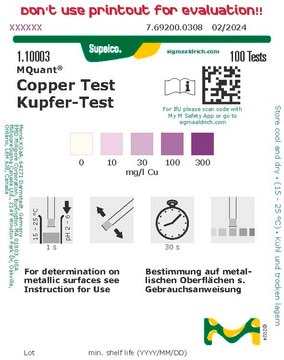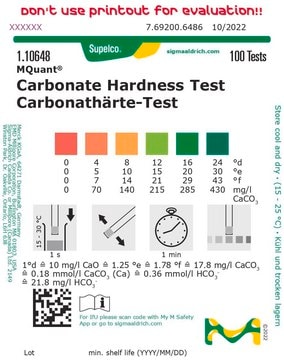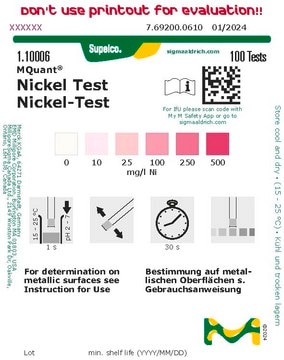1.10004
Iron Test Strips, colorimetric
3-500 mg/L (Fe²⁺), MQuant®
Sinónimos:
Iron chemical test strips
About This Item
Productos recomendados
product name
Iron Test, colorimetric, 3-500 mg/L (Fe2+), MQuant®
description
semi-quantitative
Quality Level
product line
MQuant®
specific analyte(s)
iron
greener alternative product characteristics
Waste Prevention
Learn more about the Principles of Green Chemistry.
sustainability
Greener Alternative Product
measuring range
3-500 mg/L (Fe2+)
detection method
colorimetric
greener alternative category
storage temp.
15-25°C
General description
The MQuant® test strips offer a very simple means of determining iron(II) in all aqueous media and on metal surfaces. They can thus be used to distinguish between ferrous and non-ferrous metals. Iron(II) ions react with 2,2′-bipyridine to form a red complex. The iron(II) concentration is measured semi-quantitatively by visual comparison of the reaction zone of the test strip with the fields of a color scale. For a determination of Fe(III) it is necessary to treat the sample with Ascorbic acid first, to reduce Fe(III) to Fe(II). The test strips are perfect for pre-testing a sample in an economic and quick way to estimate the iron concentration and a possible dilution factor prior to using a quantitative method such as a Reflectoquant® or Spectroquant® test.
We continue to demonstrate our commitment to our planet and a sustainable future by exploring ways to improve existing products in our portfolio. We have recently reviewed the current line of MQuant® test strips to identify key opportunities to minimize impact without compromising on the product performance.This product has benefited from:
- Test strip with reduction
- Recycled aluminum tube
- Digital instruction leaflet
Application
- Detection and evaluation of susceptibility to antibiotics in non-hydrogen sulfide-producing antibiotic-resistant soil microbe: Pseudomonas guariconensis.: This study focuses on detecting and evaluating the antibiotic resistance of Pseudomonas guariconensis, a soil microbe, using various susceptibility tests, including iron assays to understand its resistance mechanisms (Selvakumar et al., 2024).
- Genetic diversity and iron metabolism of Staphylococcus hominis isolates originating from bovine quarter milk, rectal feces, and teat apices.: The research explores the genetic diversity and iron metabolism pathways of Staphylococcus hominis isolates from different bovine sources, highlighting the role of iron assays in understanding bacterial physiology and resistance (Reydams et al., 2022).
- Anemia Prevalence, Type, and Associated Risks in a Cohort of 5.0 Million Insured Patients in the United States by Level of Kidney Function.: This large-scale study investigates anemia prevalence and types across varying levels of kidney function, utilizing iron tests to evaluate iron deficiency and its impact on health outcomes (Farrington et al., 2023).
- Influence of serum iron test results on the diagnosis of iron deficiency in children: a retrospective observational study.: This study examines how serum iron test results influence the diagnosis of iron deficiency in pediatric populations, emphasizing the importance of accurate iron testing in clinical diagnostics (Sezgin et al., 2021).
- Validation of magnetic resonance relaxometry R2 value and cyst fluid iron level for diagnosis of ovarian endometrioma.: The study validates the use of magnetic resonance relaxometry and iron level measurements in cyst fluid for diagnosing ovarian endometrioma, demonstrating the application of iron tests in medical imaging and diagnostics (Imanaka et al., 2021).
Linkage
Legal Information
Storage Class
11 - Combustible Solids
wgk_germany
WGK 2
Certificados de análisis (COA)
Busque Certificados de análisis (COA) introduciendo el número de lote del producto. Los números de lote se encuentran en la etiqueta del producto después de las palabras «Lot» o «Batch»
¿Ya tiene este producto?
Encuentre la documentación para los productos que ha comprado recientemente en la Biblioteca de documentos.
Los clientes también vieron
Nuestro equipo de científicos tiene experiencia en todas las áreas de investigación: Ciencias de la vida, Ciencia de los materiales, Síntesis química, Cromatografía, Analítica y muchas otras.
Póngase en contacto con el Servicio técnico











